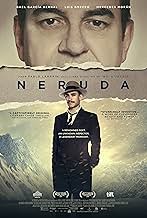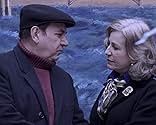Un inspecteur pourchasse le poète chilien lauréat du prix Nobel, Pablo Neruda, qui devient un fugitif dans son propre pays à la fin des années 1940 pour avoir rejoint le parti communiste.Un inspecteur pourchasse le poète chilien lauréat du prix Nobel, Pablo Neruda, qui devient un fugitif dans son propre pays à la fin des années 1940 pour avoir rejoint le parti communiste.Un inspecteur pourchasse le poète chilien lauréat du prix Nobel, Pablo Neruda, qui devient un fugitif dans son propre pays à la fin des années 1940 pour avoir rejoint le parti communiste.
- Réalisation
- Scénario
- Casting principal
- Récompenses
- 18 victoires et 36 nominations au total
Avis à la une
The camera-work covers a wide range of scenes, from film-noire urban settings to stunning snow covered terrains, all very precisely accompanied by period costumes, designs, motorcycles and horses. However the film aspires, and succeeds, to be by far more than a good period piece. Rather, it is a film about obsession. The psychological roots of this obsession are only hinted to, and this is a good thing too. And the obsessed is Gael García Bernal, playing the detective who relentlessly pursues Neruda. His performance is nothing short of stunning. As the film progresses, and it never rests for a moment, we gradually lose, alongside the characters in the film, any firm grip on reality. Just like in captivating poetic gestures, it becomes less and less clear what is real and what is fiction, what is an event and what is a fantasmatic representation of it, who is a character that actually acts and who is an imaginary ghost. And this is the film's most important achievement.
Right out of the box, Larraín archly lays bare his derogative slant toward Videla's government by showing a then-Senator Neruda wrangle with others in the Parliament's resplendent bathroom, before lends him a rodomontading stage of poem recitation during a private gathering, and later doesn't hold back in sending him into a brothel for debauchery, further on, venting barbs to his loyal helpmate Delia del Carril (an age-defying Morán), whom he must leave behind in the third act when heading to the Andes mountains where he will secretly escape to Argentina on horseback. On balance, Larraín's view of Neruda is a solid composite of varying complexities, a larger-than-life character exuding a ghost of mystique, also on the strength of Luis Gnecco's fine performance.
But essentially the film is a meta-fictional dyad of Neruda and Oscar, it is the latter's self-inspecting voice-over traverses the entire running time and whose inexorable pursuance is futile in foresight but, by virtue of Larraín's curve-ball construct of obfuscating the boundary between fiction and non-fiction, Oscar's quest of finding his identity (by the time of the third act, the predator-and-prey pursuit is saliently evolved into a poetic voyage), in fact strikes a more affecting chord with audience by being sublimated into a sort of existential mulling over an individual's congenital frailty: blindly overreaching oneself to compensate for (mostly self-induced) one's deficiency in self-esteem. Gael García Bernal effectively engineers Oscar's painful self-sacrifice with an almost pilgrim-like piety and gravitas.
On the one hand, Larraín's innovative deconstruction-inflected modus operandi brings a wheeze of freshness in the time-worn biopic genre (so is his JACKIE 2016), but on the other hand, it is still an inchoate approach that overly relies on a director's artistic propensity, in this instance, the whole package of NERUDA's saturated, purple-bluish hue, starkly freewheeling camera movement, and a disconcerted accompanying score could not be every cinephile's cuppa, notwithstanding how stimulating it might sound on paper.
The opening scene takes place in the men's room as a most serious Senate debate has flowed into an inappropriate locale. Apparently there is no relief during this time of relieving. It's here that Neruda's spoken words are as important as those he writes, and those spoken words lead directly to his need to go on the run. The poet/senator and his artist wife Delia del Carril become fugitives in their own country, and most of the film has them negotiating the Chilean underground. Set in 1948, three years after the end of WWII, a fascinating game of cat and mouse between hunter and hunted evolves. Director Larrain and writer Guillermo Calderon employ a generously creative license, and play quite fast and loose with facts resulting in a delightfully complex quasi-detective story.
Luis Gnecco plays Pablo Neruda, and actually looks very much like the Chilean icon who was influential, but also a bit prickly and burdened with his own sense of entitlement. Gael Garcia Bernal plays Inspector Peluchonneau, who is charged by the President to hunt down and capture the now enemy of the state. It's a wild chase that involves up to 300 policemen in support of the Inspector who romanticizes the chase. The filmmakers have more fun with traditional story structure as the Inspector's internal dialogue questions whether he is the lead character an idea that would never be considered by the man he is chasing.
The film has a retro look and feel, and borders on farcical at times – the shots inside a moving car appear right out of the old 1940's detective movies. But the harsh realities of the times are never far removed. It could be a Picasso speech or a concentration camp director named Pinochet (soon to play a more important role in Chile). Neither the Inspector nor the fugitive make for a trustworthy narrator, but their different perspectives constantly provide us with more bits to consider.
Luis Gnecco, Gael Garcia Bernal and Mercedes Moran (as Delia del Carril) are all excellent in their roles, and the use of music is spot on especially the score from Federico Justid (whose work I noted in Magallanes and The Secret in Their Eyes). Director Larrain also released the high profile Jackie (with Natalie Portman) over the holidays, and deserves to be discussed as one of the more creative filmmakers working today. It's pretty tough to name another contemporary film that blends an oddball inspector, a tough woman losing touch, and a narcissistic fugitive – all with bases in reality, while never settling for something as mundane as the truth.
The Chilean Noble laureate Pablo Neruda (Luis Gnecco)is depicted in Pablo Larrain's Neruda, a fiction showing the poet-politician as heroic, profane, poetic, and fat. He's a stew that can seduce women and provoke presidents, a genius communist in the late 1940's who became a fugitive for joining the party.
The film is alternately serious about this leftist politician and writer pursued by fictional police detective Oscar Peluchonneau (Gael Garcia Bernal) and playful as he cavorts with strumpets to remind us of his vigorous friend, Picasso (Emilio Guttierrez Caba). Neruda is less the poet and more the champagne Communist.
Larrain's filming is poetic, too, full of lush, shadowy shots that reinforce the complex lyrical details of a poet on the run. Yet, this is not a biopic; rather it is an imaginative rendering in the poet's own spirit as it comes through in his poetry and Stalinist affections. A scene with a drag queen discussing how Neruda incites passion is all you need to know about the difference between Neruda's magical words and the lower order of his daily life.
Although Oscar's pursuit of Neruda smacks of Javert's obsession in Les Miserables, Bernal plays him as a serious policeman with a thirst for connection to Neruda. In large part, everyone who meets Neruda, even his fellow legislators when he is a senator, seems to be hypnotized by his words and his bravery.
Most of all the film does an exemplary job of depicting Neruda as a demigod whose very presence demands devotion and a shared passion for life and happiness only through the patient devotion to one's country and one's loves:
"Love is not about property, diamonds and gifts. It is about sharing your very self with the world around you." Neruda
Le saviez-vous
- AnecdotesSeveral of the supporting characters in the film are based on real people who experienced the Videla era and Pinochet's 1973 coup. Neruda's then-wife Delia del Carril lived to be 104 years old, and died in 1989: the comment in the narration about her possibly living another four decades was accurate. Her house in Santiago (164 Avenida Lynch) is now a museum and cultural center. Alvaro (Alvaro Fernando Jara Hantke) who organized the effort to hide Pablo and Delia, was then a student in his twenties - he later became a respected historian, dying in 1998 at age 75. Victor (Victor Pey), the young Spanish-born engineer who offered his small apartment as a hiding place for the couple, helped copy and distribute Neruda's work - he survived until 2018, age 103.
- Citations
Álvaro Jara: What you want is a great escape. Yes?
Pablo Neruda: I won't play the fascists' game. I'll become their worst nightmare. In order to do that, I need to be a popular giant.
Álvaro Jara: You can't do that.
Pablo Neruda: I already have.
Álvaro Jara: No, you can't. People would say you used this persecution to become a saint. That we were never actually oppressed. That we like to play the victim. That we like to suffer. But they're killing us, for real. Look. I only ask you to be a bit more humble. Good luck on your journey.
- ConnexionsEdited into Neruda (2017)
- Bandes originalesSabes que te quiero
Composed by Carlos Cabezas (as Carlos Cabezas Rocuant)
Performed by Danilo Donoso(Percussion), Daniel Espinoza (Trumpet), Bernardo Lama(Trombone), Fernando Julio(Contrabass)
Engraving, mixing and mastering in Estudios Cablesanto 2015 y 2016
Meilleurs choix
- How long is Neruda?Alimenté par Alexa
Détails
- Date de sortie
- Pays d’origine
- Sites officiels
- Langues
- Aussi connu sous le nom de
- 追緝聶魯達
- Lieux de tournage
- Retiro, Buenos Aires, District fédéral, Argentine(Santiago city park)
- Sociétés de production
- Voir plus de crédits d'entreprise sur IMDbPro
Box-office
- Montant brut aux États-Unis et au Canada
- 939 101 $US
- Week-end de sortie aux États-Unis et au Canada
- 29 402 $US
- 18 déc. 2016
- Montant brut mondial
- 3 884 746 $US

![Regarder Tráiler [VO]](https://m.media-amazon.com/images/M/MV5BMDg2MTViOTktZmEyOS00NTAwLWI2ZGYtNmY2YjllYjk0MjM1XkEyXkFqcGdeQXRodW1ibmFpbC1pbml0aWFsaXplcg@@._V1_QL75_UY281_CR86)


































